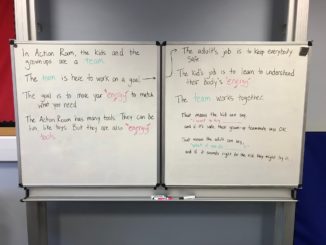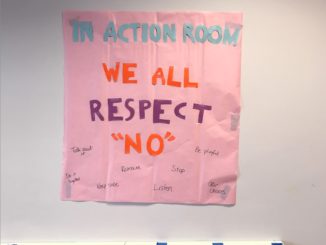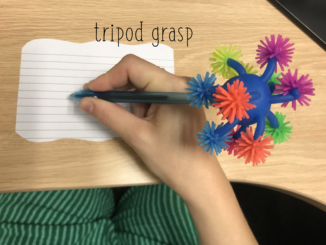I have noticed some of my language shifting when I write notes, evaluations, progress notes, etc, in an ongoing effort to be more true when I describe what children are doing—since it’s so easy for my bias (positive or negative) to creep in, and since my assessment of what their body is doing carries so much weight to the adults in their life. They could do the exact same thing but it’s how I describe it that matters on paper, so I’m trying to be more cognizant of what I write.
-“He did X for no reason” becomes “He did X for an unknown reason”. What a judgment it is for me to presume that his actions are meaningless simply because I couldn’t interpret them!
-“She has not yet been willing to X…” to “She has not yet X…” because I am not inside of her head, to say what she does and doesn’t wish or will she could do. All I can see is that her body hasn’t done it yet.
-Same caution as above with “She refused to X”. Sometimes my fingers will instinctually type “She refused to X” when I’m trying to write about a situation where I literally don’t even know if the child understood what I was asking them to do. Yet my instinct, as an adult raised and saturated in this society, is to act like that’s a personal failing on the child’s part. The verb “refuse” is so strong—as if the child clearly said “Yes, I understand exactly what you want from me and I’m conscientiously objecting”, and yet here I am occasionally instinctively trying to use it for times when I don’t even know if they could perceive my instructions, or could attend to what I was saying long enough to understand them, or had the language skills to parse out what I wanted. “Refuse” is not the right word for that.
-“Low frustration tolerance”, “frustrated easily”, “cried easily”, “overreacted”, etc…all these I’ve taken out for the exact same reasons. I wrote about it in a post before: who am I to say that their tolerance for frustration is low when they are dealing with 300x more frustrations in a day than I am? I would be at my limit too! Instead I’ve tried swapping in just literal description of what happened if applicable — “When she tried to draw the shape, her pencil slipped and drew an extra line across the paper. She got frustrated and yelled.” If I need a general statement, I reach for something like, “he spends most of each school day at a high baseline of stress”.
-I have almost entirely let go of the phrasing “preferred activities”/“non-preferred activities”. There are still rare occasional uses, but most of the time I find its uses to be a little bit ridiculous. They almost seem to punish a kid for beginning to enjoy school things, and they act like everyone on the entire planet doesn’t have things they prefer to do rather than other things. Instead, if my intent is to write about what a child loves just so that I have that information there to inspire ideas or build rapport in the future (NOT to bribe or punish them with!!), I will write “he enjoys…” or “his favorite thing is…” or “he describes that the part of school he likes most is…” And if I need to describe a child not liking something, I’ll be specific about what it is that led me to believe that. Did they tell me verbally? Do they run away from it in the classroom? I put that information instead of lumping it all under “non-preferred.” “When asked to write, she will usually hide under the table.” “She explained to therapist that writing hurts her hand and that she is aware that she reverses letters sometimes.”



